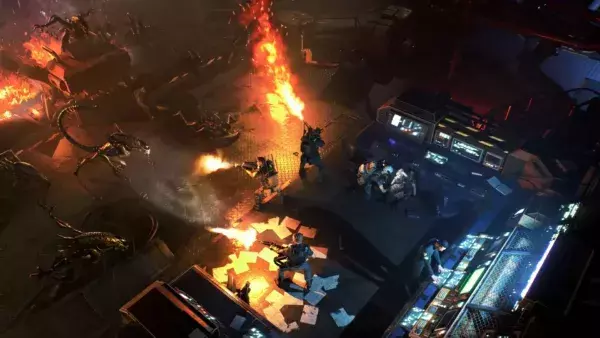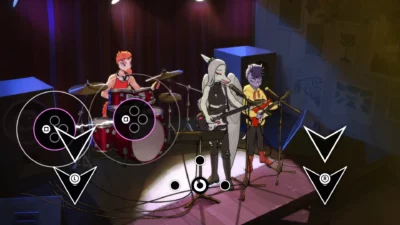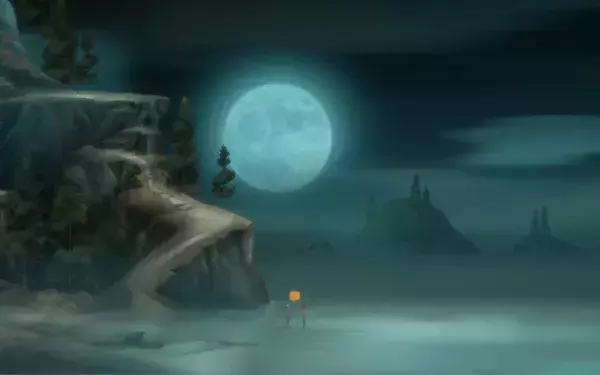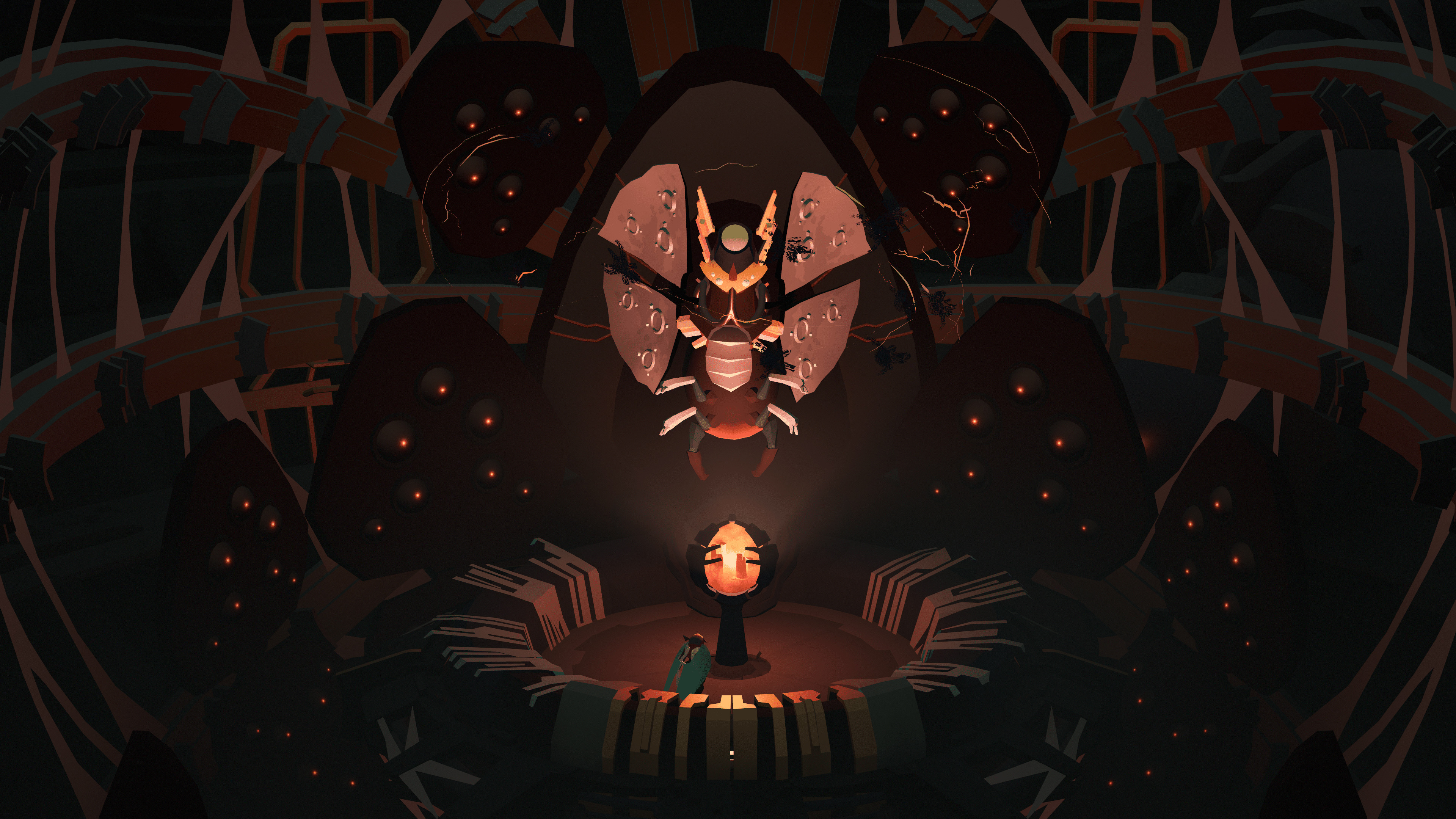
Former developers of Inside and Limbo return with a mind-boggling puzzler that places worlds within worlds within worlds. Our review of Cocoon:
Where today’s games generally spend too much time faffing about or promising you it gets good 10 or 20 hours in, Cocoon wastes absolutely no time in getting you to the good stuff. Even when you first press start, the opening shot that introduces your peculiar winged bug-guy protagonist is already immediately arresting. Then it takes no more than five minutes before you discover Cocoon’s big idea…
Geometric Interactive consists of ex-Playdead members Jeppe Carlsen and Jakob Schmid (Limbo, Inside), so it’s little surprise that this 3D puzzle adventure excels in generating an otherworldly atmosphere without the need for text, dialogue, or other rudimentary signposting. You’re wordlessly compelled to wander the mysterious environments, with a single button used for interaction (though for accessibility, you can have every face button mapped to the same function, too).
If that wasn’t enough, Cocoon then takes you out of this world – literally. Step onto a special pad, hold the button, and bug-guy does one of the coolest animations of the year: your character leaps through space and into another world, with the realm they’ve left behind no more than the size of an orb. An orb you can carry on your back.
It’s essentially that gag in the 1997 sci-fi action comedy Men In Black, where whole worlds or galaxies are little more than marbles used as playthings by giant alien lifeforms. The execution is nonetheless mind-boggling, and while you’ll be jumping in and out of worlds like this throughout the game, the sequence is a constant headtrip. Compared to the bloated Starfield, where exploration is broken up by one loading screen after another, it’s astonishing to see this seamless world-jumping traversal compressed into a game just barely over one gigabyte on PS5.
This isn’t just a visual gimmick, either; it’s crucial to Cocoon’s puzzle mechanics, as an orb is not only a world you can jump into (provided it’s placed on the appropriate pedestal) but has its own unique properties when being carried. The orange orb, for instance, makes orange paths materialise that otherwise wouldn’t exist, while the green orb lets you traverse up and down greenish pillars of mist. There’s a bit of a Metroidvania to exploration as you realise certain paths in one world are only accessible once you have an orb in another. That’s right: you end up having worlds within worlds within worlds, which also neatly appear as a coloured orb inside another coloured orb. Try to stop your brain from imploding.
To stop everything running away from you, there are some limitations imposed on the design, however. You can’t just drop an orb whenever you fancy – there are pedestals around where they can be set down (including the aforementioned ones that also allow you to jump into an orb’s world). If you’re carrying one orb already, the one you pick up will be swapped with the one currently on your back. It’s obviously most convenient to carry orbs within orbs, but sometimes you need both orbs’ powers in the same world so they have to be carried around one at a time, which can get a little tedious at times. Much cleverer, however, are later puzzles where you do have to rely on an orb triggering an effect within another orb, which I’ll say no more about in case of spoilers. Also, trying to explain these would get me all tangled up.
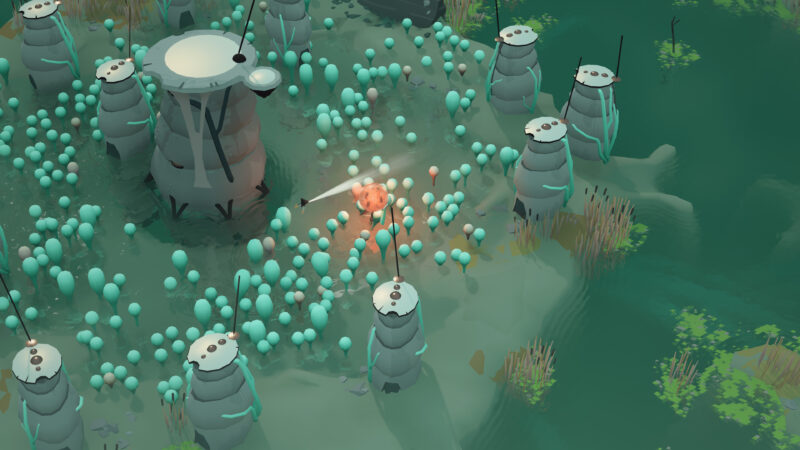
There’s also a hint of Inside in some puzzles where you’re either manipulating other sentient things to help you progress or tricking sentries otherwise impeding your path, albeit without the same grisly fail states. Indeed, through all its ambient mystery, Cocoon is a pretty chill game, but also one where its authorship is considered and omniscient. I may have referenced the Metroidvania genre, but in truth, Cocoon is a pretty linear game where a puzzle has a single solution, albeit one that always looks and feels cool and rewarding when solved. And although it’s not always clear when a checkpoint starts when you return to it for another session, it’s not really a game you’re going to get lost in, as sometimes you’re purposely boxed into a specific area until you figure out a way forward. A nice touch is that you also get a subtle music cue change to indicate that you’ve done something right.
It’s extraordinary that, despite its lack of narrative or explanation, Cocoon remains mysterious and compelling enough to keep you engaged to the end. (In terms of narrative, the best I got was from the optional quests of freeing one of many Moon Ancestors found in the game, and that was only because I read the Trophy description.) To be fair, the ending delivers on what the title implies on a cosmic scale. And with its focus on creative gameplay mechanics, Cocoon is a more successful follow-up from a former Playdead alumnus compared to last year’s Somerville.
And yet, for all the ways Cocoon is clearly a clever and cool game, there was also something about it that didn’t completely resonate with me. It’s in the little things, I suppose: the lack of friction in the puzzling, the somewhat abstract and removed nature of the setting, a game that goes for the head over the heart. It’s a phenomenal, intricately designed piece of art that’s impressive in how much it delivers in such a compact form, and if you’re subscribed to Game Pass you’d be a fool to skip it. I’m just not entirely sure people will be talking about it in the same way we did about the ending of Inside.
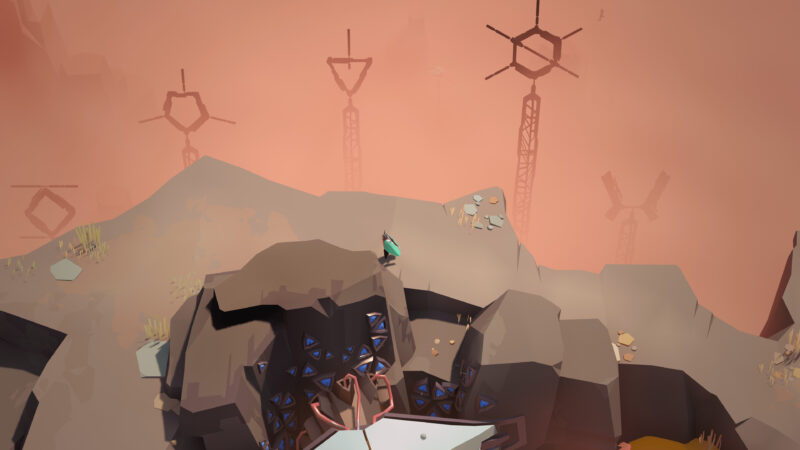
Highlight
While mostly an atmospheric puzzler, Cocoon is punctuated by set-piece boss encounters centred on what are often one-off mechanics. They’re fairly low-stakes, because despite essentially being an instant fail if you make contact with the boss, all that happens is you get chucked out of the world – you can simply dive back in and try again.
Verdict: 85%
Cocoon maybe a little too weird for its own good, but it’s still one of the smartest and coolest puzzlers of the year.


